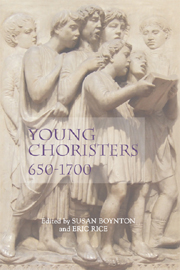Book contents
- Frontmatter
- Contents
- List of Illustrations
- List of Musical Examples
- Acknowledgements
- Dedication
- Introduction: Performance and Premodern Childhood
- 1 The Boy Singers of the Roman Schola Cantorum
- 2 Boy Singers in Medieval Monasteries and Cathedrals
- 3 The Musical Education of Young Girls in Medieval English Nunneries
- 4 Choirboys in Early English Religious Drama
- 5 From Mozos de coro towards Seises: Boys in the Musical Life of Seville Cathedral in the Fifteenth and Sixteenth Centuries
- 6 The Seeds of Medieval Music: Choirboys and Musical Training in a Late-Medieval Maîtrise
- 7 Choirboys in Cambrai in the Fifteenth Century
- 8 Choirboys and Vicaires at the Maîtrise of Cambrai: A Socio-anthropological Study (1550–1670)
- 9 Choirboys, Memorial Endowments and Education at Aachen's Marienkirche
- 10 Thomas Mulliner: An Apprentice of John Heywood?
- 11 Cantando tutte insieme: Training Girl Singers in Early Modern Sienese Convents
- 12 Choirboys in Early Modern Rome
- General Bibliography
- Index
Introduction: Performance and Premodern Childhood
Published online by Cambridge University Press: 12 September 2012
- Frontmatter
- Contents
- List of Illustrations
- List of Musical Examples
- Acknowledgements
- Dedication
- Introduction: Performance and Premodern Childhood
- 1 The Boy Singers of the Roman Schola Cantorum
- 2 Boy Singers in Medieval Monasteries and Cathedrals
- 3 The Musical Education of Young Girls in Medieval English Nunneries
- 4 Choirboys in Early English Religious Drama
- 5 From Mozos de coro towards Seises: Boys in the Musical Life of Seville Cathedral in the Fifteenth and Sixteenth Centuries
- 6 The Seeds of Medieval Music: Choirboys and Musical Training in a Late-Medieval Maîtrise
- 7 Choirboys in Cambrai in the Fifteenth Century
- 8 Choirboys and Vicaires at the Maîtrise of Cambrai: A Socio-anthropological Study (1550–1670)
- 9 Choirboys, Memorial Endowments and Education at Aachen's Marienkirche
- 10 Thomas Mulliner: An Apprentice of John Heywood?
- 11 Cantando tutte insieme: Training Girl Singers in Early Modern Sienese Convents
- 12 Choirboys in Early Modern Rome
- General Bibliography
- Index
Summary
Concerning the request of Johannes Sterck, a choirboy of this church, in which he petitioned for release on account of the change of his voice, it is decided that since he can still serve the choir in one way or another, he should remain, [and should] devote between the end of Matins until the high Mass to his course of study.
(Chapter minutes of the collegiate church of St. Mary in Aachen, December, 1598)ARCHIVAL entries such as this one have provided music historians with a wealth of information on the education and administration of choirboys in the Middle Ages and early modern period. Such information has traditionally been employed in studies of performance context in which an understanding of young performers' abilities and responsibilities contributes to an overall picture of ecclesiastical and musical life. Mostly unexplored is the experience of young singers as performers and, especially, as children – a social group perceived by their elders as physically, intellectually, and emotionally immature. Given the nature of the surviving sources, this inattention to the experience of young singers is not surprising, for although we possess a great many documents pertaining to the administration of choirboys, for the most part we lack firstperson accounts by ecclesiastical choirmasters and singers, and we know of none written or dictated by children.
The administrative documents that do survive often raise as many questions as they answer. In the entry above, for example, we learn that Johannes Sterck was denied a request to leave the service of Aachen’s collegiate church despite the fact that his voice had broken. The church’s canons not only asserted that his service to the choir could and should continue, albeit in a capacity other than performance, but also affirmed their responsibility to educate him. If he could serve the choir in other ways, why did Sterck wish to leave the church’s service? Perhaps he understood singing to be his primary function in the church and petitioned for release because he was no longer able to fulfill his duties. Did the canons’ affirmation of their responsibility to educate, feed, house, and clothe him constitute concern for his welfare and acknowledgement of his immaturity, or was it simply the means by which the church continued to make use of his labor? In sum, what were church officials’ conceptions of childhood and how did these apply to the working lives of young musicians?
- Type
- Chapter
- Information
- Young Choristers, 650–1700 , pp. 1 - 18Publisher: Boydell & BrewerPrint publication year: 2008



